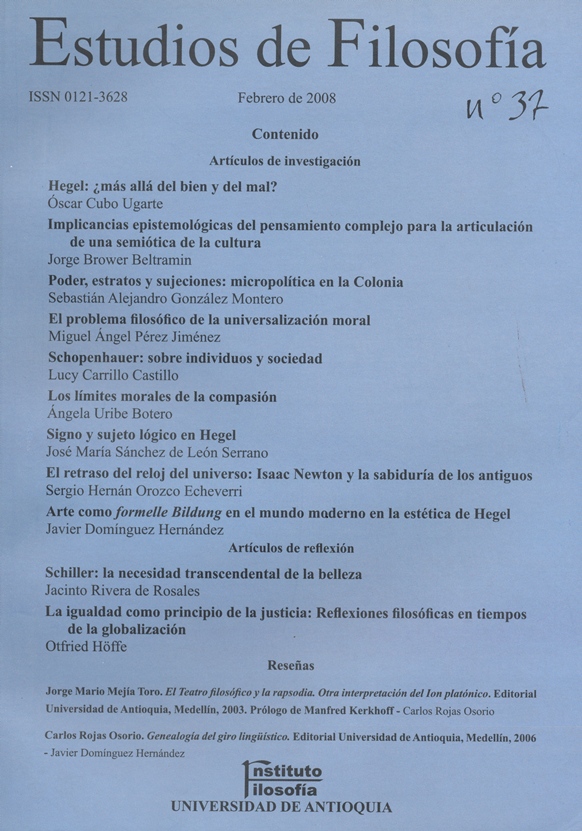Art as formelle Bildung in the Modern World in Hegel`s Aesthetics
DOI:
https://doi.org/10.17533/udea.ef.12729Keywords:
Art and ethics, formelle Bildung, art and culture of the judgment, religion of art, Hegel, art and presentAbstract
Formelle Bildung is Hegel`s concept to determine the historical function of art in the modern world. This function contrasts with inhaltliche Bildung or substantielle Bildung that was brought about by art in the Orient and in the Greek Classical World, and in general with the decisive function that art has in the ethos of cultures were art is inseparable from religion, where, according to Hegel, art operates according to a supreme determination. But even though art in modern culture can no longer be Kunstreligión, religion made of art, this doesn`t mean that it has lost its function as a culture factor, but that it still is indispensable in culture, even though it is not for the community to identify itself with the contents that art represents for it, but for individuals to confront themselves in a critico-reflexive way. In the modern world, art is no longer an art of a community but an art of and for a society, in such a way that the State and institucionallity are mediators of it. Art is now autonomous and doesn`t determine doctrinarily nor ideologically the ethos, but the way to provide its intuitions and its representations for reflection, promotes the free exercise of the judgment of individuals. According to Hegel, the “formal” carácter of culture that is provided by modern art, makes art turn into a fundamental matter of cultural policy, where art and public come into the foreground.
Downloads
References
ARNDT, A. et. al. (Hrsg.) Hegels Ästhetik. Die Kunst der Politik – Die politik der Kunst. 2 vol. En: Hegels Jahrbuch 1999 / 2000. Akademie Verlag, Berlin, 2000.
DANTO, A. C. El abuso de la belleza. Paidós, Barcelona, 2005.
DOMÍNGUEZ, J. “¿Religión del arte o comprensión del arte? La crítica de Hegel al Romanticismo”, Estudios de Filosofía, 28, pp. 123-142.
GADAMER, H.-G. Verdad y método. Fundamentos de una hermenéutica filosófica. Ediciones Sígueme, Salamanca, 1984.
GETHMANN-SIEFERT, A. Das ‘moderne’ Gesamtkunstwerk: die Oper. En: “Phänomen versus System. Zum Verhältnis von philosophischer Systematik und Kunsturteil in Hegels Berliner Vorlesungen über Ästhetik oder Philosophie der Kunst”, Hegel-Studien, 34, Bonn, Bouvier Verlag Herbert Grundmann, 1992.
GETHMANN-SIEFERT, A. et. al (Hrsg.) Die geschichtliche Bedeutung der Kunst und die Bestimmung der Künste.. Wilhelm Fink Verlag, München, 2005.
GETHMANN-SIEFERT, A. Einfhürung in Hegels Ästhetik. Wilhelm Fink Verlag München, 2005.
GOETHE, J. W. Antología poética. Planeta, Barcelona, 1999.
HEGEL, G.W.F. Berliner Antrittsrede (1818). En: Berliner Schriften (1818-1831). Felix Meiner Verlag, Hamburg, 1997.
HEGEL, G.W.F. Lecciones sobre la estética. Según la edición de H. G. Hotho (1842). Trad. de A. Brotóns. Akal, Madrid, 1989.
HEGEL, G.W.F. Vorlesungen über die Philosophie der Kunst. Berlin 1823. Nachgeschrieben von H.G.Hotho. Gethmann-Siefert, A. (Hrsg.). Felix Meiner Verlag, Hamburg, 2003.
JAMME, C. und VÖLKEL, F. (Hrsg.) Kunst und Geschichte im Zeitalter Hegels. Felix Meiner Verlag, Hamburg, 1996.
KLOTZ, H. Die ‘ästhetische Kirche’ – Das Museum. Geschichte der Deutschen Kunst, Vol. 3, Neuzeit und Moderne 1750-2000. Verlag C.H. Beck, München, 2000.
KWON, J-I. Das moderne Ideal und die kulturelle Rolle der Kunst. Hegels Bestimmung der Kunst in der Gegenwart. En: Kulturpolitik und Kunstgeschichte. Perspektiven der Hegelschen Ästhetik. Franke, U. und Gethmann-Siefert, A (Hrsg.). Felix Meiner Verlag, Hamburg, 2005.
PÖGGELER, O. und GETHMANN-SIEFERT, A. (Hrsg.) Kunsterfahrung und Kulturpolitik im Berlin Hegels, Hegel-Studien / Beiheft 22. Bouvier Verlag Herbert Grundmann, Bonn, 1983.
SCHELLING, F.W.J. Anexo: Lecciones sobre el método de los estudios académicos. Lección catorce: Sobre la ciencia del arte en relación con los estudios académicos. En: Filosofía del arte. Trad. V. López-Domínguez. Tecnos, Madrid, 1999.
SHEEHAN, James J. Geschichte der Deutschen Kunstmuseen. Von der fürstlichen Kunstkammer zur modernen Sammlung. Verlag C. H. Beck, München 2002.
Downloads
Published
How to Cite
Issue
Section
Categories
License
Copyright (c) 2008 Javier Domínguez Hernández

This work is licensed under a Creative Commons Attribution-NonCommercial-ShareAlike 4.0 International License.
Authors who publish with this journal agree to the following terms:
1. The Author retains copyright in the Work, where the term "Work" shall include all digital objects that may result in subsequent electronic publication or distribution.
2. Upon acceptance of the Work, the author shall grant to the Publisher the right of first publication of the Work.
3. The Author shall grant to the Publisher a nonexclusive perpetual right and license to publish, archive, and make accessible the Work in whole or in part in all forms of media now or hereafter known under a Creative Commons Attribution-NoCommercia-ShareAlike (CC BY-NC-SA 4.0), or its equivalent, which, for the avoidance of doubt, allows others to copy, distribute, and transmit the Work under the following conditions: (a) Attribution: Other users must attribute the Work in the manner specified by the author as indicated on the journal Web site;(b) Noncommercial: Other users (including Publisher) may not use this Work for commercial purposes;
4. The Author is able to enter into separate, additional contractual arrangements for the nonexclusive distribution of the journal's published version of the Work (e.g., post it to an institutional repository or publish it in a book), as long as there is provided in the document an acknowledgement of its initial publication in this journal;
5. Authors are permitted, and Estudios de Filosofía promotes, to post online the preprint manuscript of the Work in institutional repositories or on their Websites prior to and during the submission process, as it can lead to productive exchanges, as well as earlier and greater citation of published work (see The Effect of Open Access). Any such posting made before acceptance and publication of the Work is expected be updated upon publication to include a reference to the Estudios de Filosofía's assigned URL to the Article and its final published version in Estudios de Filosofía.















